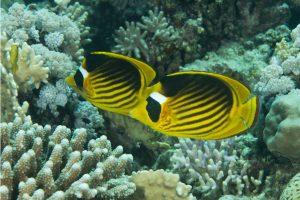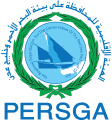In the framework of the implementation of the Strategic Ecosystem Management of the Red Sea and Gulf of Aden (SEM) project, a technical team conducted a mission to Dungonab MPA in Sudan, during the period 27th October to 1st November 2014. The mission team included Dr. Ahmed Khalil, PERSGA Coordinator for Living Marine Resources and Climate Change; Dr. Maher Amer, PERSGA Coordinator for Biodiversity and MPAs; Professor Mahmoud Hanafy, SEM project consultant for capacity building for MPA management; and Dr. Mohamed Zibdeh, SEM project consultant for building the capacity of local user groups and fishing communities.
The mission aimed at familiarizing the SEM consultants with the project site, national partners, steering committee and local community members; identifying and discussing capacity building needs, priorities and requirements under components 1 and 2; assessing facilities for organizing future capacity building and awareness workshops and activities; and providing further awareness about project objectives and activities to local stakeholders and authorities.
The mission team carried out a series of meetings with HE the Minister of Environment and Tourism of the Red Sea State, national authority and local counterparts. The mission team also conducted a field visit to Dungonab MPA. Here they held several consultation meetings with the local community including meetings with the Mayor of Dungonab village, school teachers, local authorities for public health, medical services and the environment, the local fishing community, and a meeting with the site director of the “Gulf Pearl Company” which has recently installed works and facilities for pearl aquaculture.
The meeting with HE the Minister discussed several issues regarding the project’s objectives, its components and activities, progress made and further details on those project activities that focus on developing the management plan of Dungonab MPA and capacity building to enable implementation of the plan as a pilot site. Meetings of the mission team with the National Steering Committee (NSC) and with the local community at the project site considered the characteristics of the pilot site in relation to the project’s objectives and the current strengths and weaknesses in the plans for project implementation and capacity building. Most of the natural habitats in rural coastal areas are still in a pristine state with little disturbance, mainly because of the low population in these areas. The training and capacity building provided by the SEM project will build on earlier efforts and focus on the best approaches to improve the fish production/ marketing chain, including finfish, shellfish and pearl oyster culture. Other issues tackled by the project will include monitoring of fishery and coastal habitats through MPA management; gender and family contribution to household income; ecotourism; environmental education and awareness. Training related to the management of fishery cooperatives is essential to promote sustainable fish production and marketing.
More to find

National Workshop on Environmental Monitoring and Communicating with Stakeholders Applying …

Consultation Mission in Dungunab and Mukkawar Island National Park Meeting …

Follow up of Monitoring Activities and Procurement of Monitoring Equipment



